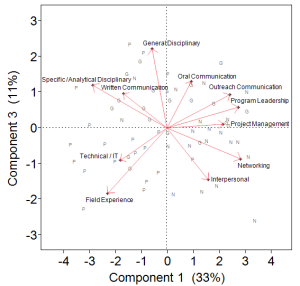
A few weeks ago I heard from an early-career researcher in the U.S. who had some intelligent things to say about getting jobs in conservation science based on a recent Conservation Biology paper she co-wrote. Of course, for all the PhDs universities are pumping out into the workforce, there will never be enough positions in academia for them all. Thus, many find their way into non-academic positions. But – does a PhD in science prepare you well enough for the non-academic world? Apparently not.
–
Many post-graduate students don’t start looking at job advertisements until we are actually ready to apply for a job. How often do we gleam the list of required skills and say, “If only I had done something to acquire project management skills or fundraising skills, then I could apply for this position…”? Many of us start post-graduate degrees assuming that our disciplinary training for that higher degree will prepare us appropriately for the job market. In conservation science, however, many non-disciplinary skills (i.e., beyond those needed to be a good scientist) are required to compete successfully for non-academic positions. What are these skills?
Our recent paper in Conservation Biology (Graduate student’s guide to necessary skills for nonacademic conservation careers) sifted through U.S. job advertisements and quantified how often different skills are required across three job sectors: nonprofit, government and private. Our analysis revealed that several non-disciplinary skills are particularly critical for job applicants in conservation science. The top five non-disciplinary skills were project management, interpersonal, written communication, program leadership and networking. Approximately 75% of the average job advertisement focused on disciplinary training and these five skills. In addition, the importance of certain skills differed across the different job sectors.
Below, we outline the paper’s major findings with regard to the top five skills, differences among sectors, and advice for how to achieve appropriate training while still in university.
1. Project management
This crucial skill goes beyond the basics of just doing your research. It involves planning, balance, schedules, budgets and implementation. If your research involves multiple projects in the field or lab, coordinating with collaborators and/or scheduling meetings, work days, grant deadlines that involve employees or partners, then you have a leg-up with this particular skill. Experience with project management will likely also enhance other skills such as interpersonal skills, multi-tasking and personnel leadership.
2. Program leadership
Non-dissertation experiences can provide leadership skills. Organising a conference, leading a club or chapter, or running regular meetings quickly signal this skill. If your dissertation project involves others that are not your employee (e.g., lab members), motivating and organizing their efforts demonstrates your leadership ability.
3. Interpersonal skills
Many employers examine this skill through your behaviour during the interview process. However, having documented evidence of your ability to work well within a diversity of teams can still be highly useful. Being part of (or leading!) workshops that involve people of differing backgrounds, especially non-academic, would be a great indicator for this skill. Producing products is an integral part of demonstrating your interpersonal skills. Just attending a meeting will not suffice!
4. Networking
This skill involves developing relationships outside of your inner circle (e.g., beyond the lab group). Being a good networker means you can develop partnerships and collaborate with diverse groups. Writing multi-authored published papers may signal this skill. If your project involves outside organisations, you can document that networking via presentations, collaborative reports, workshops and other multi-person activities.
5. Written communication
Referencing your written dissertation is unlikely to satisfy employers on this point. Successful proposal and grant writing might suffice, but to stand out from the crowd, you should find other ways to demonstrate this skill, such as with popular articles on your research (such as blog posts!), peer-reviewed publications or fact-sheets for outreach. Don’t forget the importance of a well-written cover letter and CV!

Skill loadings on PCA Components 1 and 3. Skill sets associated with Components 1 and 3 were useful for distinguishing among job sectors. Government jobs were associated with intermediate values on axis 1 and high values on axis 3. Non-profit jobs were associated with high values on Component 1 and intermediate values on Component 3. Private jobs were associated with low values on Component 1 and intermediate values on Component 3.
Major differences among jobs and sectors
Differences among jobs tended to align with differences among job sectors. For example, some jobs emphasised that conservation is a social process and required interpersonal, networking, oral communication, outreach communication, program leadership and project management skills. Other jobs focused on the production of technical information in support of conservation and emphasised technical and information technology skills, written communication skills, specific disciplinary skills and field experience. Nonprofit jobs tended to rank higher for the former skill-set, while private and government jobs tended to highlight the latter.
With regard to less commonly mentioned skills, nonprofit advertisements sometimes sought candidates that had fundraising and monetary skills, as well as cultural and international experience. Government advertisements occasionally featured conflict resolution and negotiation skills, while the private sector focused primarily on information technology skills and field experience.
How to get the skills you need
(1) Focus on the ‘top five’ skills, which are transferable across job sectors.
(2) Decide on a career track early in post-graduate training and tailor your work accordingly. Augment your transferable skill set with sector-specific skills, such as technical and IT skills, or outreach communication.
(4) Start collecting job information early. Develop a process to scan and evaluate job advertisements long before you are ready to apply so you develop the skills needed for the positions you find appealing.
(5) Volunteer with potential future employers.
(6) When applying, include experiences that might have nothing to do with your dissertation or even your academic career! Do you coach a sports team? Do you organise volunteer events?
An expanding field
Surprisingly, interdisciplinary and multi-disciplinary training did not emerge as a key skill. This could reflect a shift in employer focus. Rather than hiring biologists who have experience in business or economics, many organisations may now be looking to hire a suite of specialists with advanced degrees in a variety of disciplines, including biology, business, social science, political science and economics. If this is the case, scientists with different academic backgrounds will be increasingly required to collaborate, which will make interpersonal and networking skills even more critical.
So what can post-graduate students do to improve their chances of eventually landing a ‘dream job’? Develop transferable skills, focus on compatible groups of skills, gain experiences that extend beyond the dissertation, and make sure to showcase these non-disciplinary skills and experiences (along with disciplinary expertise) on a CV or during an interview. It may sound like a lot, but in our experience, most post-graduate students are already doing most of these things. The crux may be realising that non-academic employers will probably value your club leadership almost as much as your statistical know-how.
Kristy Deiner, Lauren M. Porensky and Marit L. Wilkerson
-34.917731 138.603034
